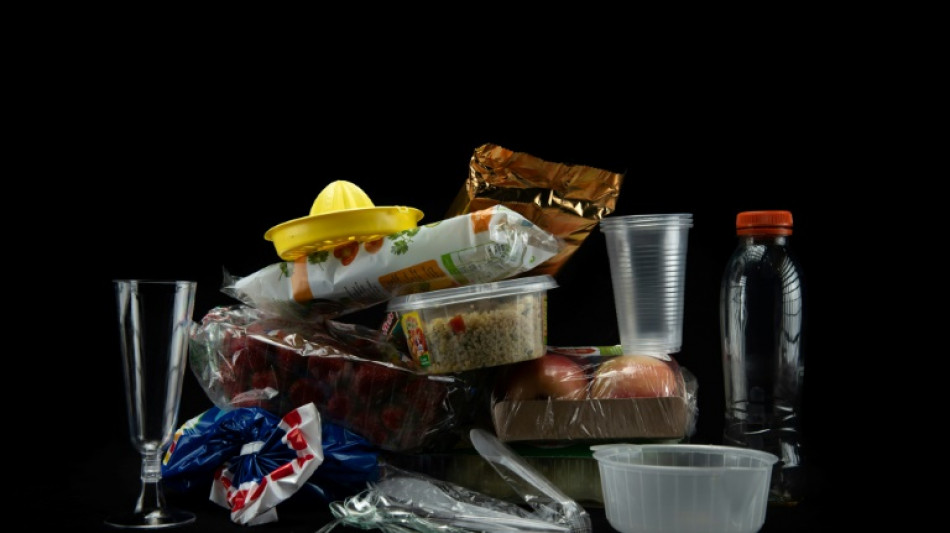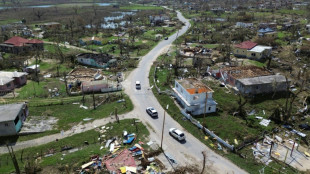
-
 US Navy veterans battle PTSD with psychedelics
US Navy veterans battle PTSD with psychedelics
-
'Unheard of': Dodgers in awe of iron man Yamamoto

-
 UK police probe mass train stabbing that wounded 10
UK police probe mass train stabbing that wounded 10
-
'It's hard' - Jays manager Schneider rues missed chances in World Series defeat

-
 Women's cricket set for new champion as India, South Africa clash
Women's cricket set for new champion as India, South Africa clash
-
Messi scores but Miami lose as Nashville level MLS Cup playoff series

-
 Dodgers clinch back-to-back World Series as Blue Jays downed in thriller
Dodgers clinch back-to-back World Series as Blue Jays downed in thriller
-
Vietnam flood death toll rises to 35: disaster agency

-
 History-making Japan golf twins push each other to greater heights
History-making Japan golf twins push each other to greater heights
-
Death becomes a growing business in ageing, lonely South Korea

-
 India's cloud seeding trials 'costly spectacle'
India's cloud seeding trials 'costly spectacle'
-
Chiba wins women's title, Malinin leads at Skate Canada

-
 Siakam sparks injury-hit Pacers to season's first NBA win
Siakam sparks injury-hit Pacers to season's first NBA win
-
Denmark's fabled restaurant noma sells products to amateur cooks

-
 UK train stabbing wounds 10, two suspects arrested
UK train stabbing wounds 10, two suspects arrested
-
Nashville top Messi's Miami 2-1 to level MLS Cup playoff series

-
 Fergie, her daughters and the corgis hit by Andrew crisis
Fergie, her daughters and the corgis hit by Andrew crisis
-
'I can't eat': Millions risk losing food aid during US shutdown

-
 High price of gold inspires new rush in California
High price of gold inspires new rush in California
-
'Swing for the fences': Carney promises bold budget as US threat grows

-
 UK police arrest two after 'multiple people' stabbed on train
UK police arrest two after 'multiple people' stabbed on train
-
NBA Hawks lose guard Young for four weeks with knee sprain

-
 50 dead as Caribbean digs out from Hurricane Melissa
50 dead as Caribbean digs out from Hurricane Melissa
-
Forever Young gives Japan first Breeders' Cup Classic triumph

-
 Mbappe's Real Madrid extend Liga lead, Villarreal move second
Mbappe's Real Madrid extend Liga lead, Villarreal move second
-
Salah savours 'great feeling' after 250th Liverpool goal

-
 Ethical Diamond surges to upset win in $5 million Breeders' Cup Turf
Ethical Diamond surges to upset win in $5 million Breeders' Cup Turf
-
Kinghorn kicks Toulouse to Top 14 summit

-
 Mbappe extends Real Madrid's Liga lead in Valencia rout
Mbappe extends Real Madrid's Liga lead in Valencia rout
-
All Blacks sink 14-man Ireland 26-13 in Chicago Test

-
 World champ Malinin takes lead at Skate Canada
World champ Malinin takes lead at Skate Canada
-
Liverpool snap losing streak as Salah hits 250 goals in Villa win

-
 Salah's 250th Liverpool goal sinks Villa as Arsenal cruise at Burnley
Salah's 250th Liverpool goal sinks Villa as Arsenal cruise at Burnley
-
Morant suspended by Grizzlies after rebuking coaching staff

-
 Spalletti begins Juve tenure with win at Cremonese but Napoli held
Spalletti begins Juve tenure with win at Cremonese but Napoli held
-
Frank refuses to condemn Van de Ven, Spence for snub in Spurs defeat

-
 France superstar Dupont extends Toulouse deal
France superstar Dupont extends Toulouse deal
-
Egypt officially opens grand museum near pyramids

-
 French fraud watchdog reports Shein for 'childlike' sex dolls
French fraud watchdog reports Shein for 'childlike' sex dolls
-
Scotland thrash USA before All Blacks' clash

-
 Five things to know about the Grand Egyptian Museum
Five things to know about the Grand Egyptian Museum
-
Bayern rest stars but ease past Leverkusen before PSG clash

-
 Dead quiet: Paris Catacombs close for renovations
Dead quiet: Paris Catacombs close for renovations
-
Families separated, children killed as survivors flee Sudan's 'apocalyptic' El-Fasher

-
 Napoli held by Como as Spalletti begins Juve adventure
Napoli held by Como as Spalletti begins Juve adventure
-
Southampton boss Still vows to fight on as pressure mounts

-
 Borthwick hails 'ball of energy' Pollock as England down Australia
Borthwick hails 'ball of energy' Pollock as England down Australia
-
Egypt opens grand museum in lavish, pharaonic ceremony

-
 Joao Pedro strikes at last as Chelsea edge past Spurs
Joao Pedro strikes at last as Chelsea edge past Spurs
-
Ohtani to open for Dodgers in World Series deciding game seven


Over 3,600 food packaging chemicals found in human bodies
More than 3,600 chemicals used in food packaging or preparation have been detected in human bodies, some of which are hazardous to health, while little is known about others, a study said Tuesday.
Around 100 of these chemicals are considered to be of "high concern" to human health, said lead study author Birgit Geueke from the Food Packaging Forum Foundation, a Zurich-based NGO.
Some of these chemicals are relatively well-studied and have already been found in human bodies, such as PFAS "forever chemicals" and bisphenol A -- both of which are the target of bans.
But little is known about the health effects of others, Geueke told AFP, calling for more research into how chemicals used in packaging end up being swallowed along with food.
The researchers had previously catalogued around 14,000 food contact chemicals (FCCs), which are capable of "migrating" into food from packaging made of plastic, paper, glass, metal or other materials.
They can also come from other parts of the food-making process, such as from conveyer belts or kitchen utensils.
The researchers then searched for these chemicals in existing biomonitoring databases, which track chemicals in human samples.
The team was expecting to find a few hundred FCCs, Geueke said. Instead, they were surprised to find 3,601 -- a quarter of all the known FCCs.
Geueke emphasised that this study could not show that all these chemicals necessarily ended up in bodies from food packaging, as "other exposure sources are possible".
Among the "high concern" chemicals were numerous PFAS, also known as forever chemicals, which have been detected in many parts of the human body in recent years and linked to a range of health problems.
Also detected was bisphenol A, a hormone-disrupting chemical used to make plastics that has already been banned from baby bottles in many countries.
Another hormone-disrupting chemical was phthalates, which has been linked to infertility.
Less is known about oligomers, which are also byproducts of plastic production.
"There is almost no evidence on the health effects of these chemicals," Geueke said.
- Reduce contact with packaging -
When it comes to toxicology, an old saying is that "the dose makes the poison".
A limitation of the study was that it could not say whether there were particularly high concentrations of any of the chemicals, Geueke acknowledged.
But she warned that these chemicals can interact with each other, pointing to a single sample that had up to 30 different PFAS.
Geueke recommended that people reduce their contact time with packaging -- and to avoid heating up food in the packaging it came in.
"We don't want to cause any alarm or panic, but to raise awareness that the way we package our food is... going in a direction which is not good for the environment and human health," she said.
And on the bright side, Geueke pointed out, some of the chemicals are already facing bans.
The European Union is in the final stages of banning the use of PFAS in food packaging. The EU has also proposed a similar ban for bisphenol A from the end of this year.
The study was published in the Journal of Exposure Science and Environmental Epidemiology.
M.Betschart--VB




